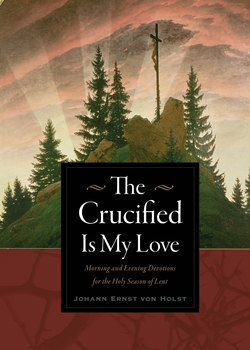Читать книгу The Crucified Is My Love - Johann Ernst von Holst - Страница 22
На сайте Литреса книга снята с продажи.
Оглавление14
Tuesday Evening
When I Am Lifted Up
“And I, when I am lifted up from the earth, will draw all people to myself.” He said this to show by what kind of death he was going to die.
John 12:32–33
THE LORD SPOKE THIS WORD about his being lifted up to the Jewish people and to the seeking Greeks shortly after he had entered the temple forecourt. What he meant here by his “lifting up” is explained not only by John’s addition, “This he said to indicate the kind of death he was to die,” but also by what the Lord himself said to Nicodemus, “And just as Moses lifted up the serpent in the wilderness, so must the Son of Man be lifted up” (John 3:14).
In contrast to the lifting up desired by the disciples and the populace (that is, being raised to the royal throne of a worldly monarchy) the Lord here envisages being lifted up on the cross, where in his sacrificial death he was to bear the whole curse that the serpent had brought upon the human race. Nevertheless, just as the foot of the cross was rooted in the earth while its head was raised to heaven, he was to die only in order to be raised to the throne of heavenly majesty through overcoming death and bursting the grave. Thus he combines in one prophetic saying his being lifted up on the cross and his elevation to glory.
“I will draw all people to myself” means he will not coerce with outward force but draw them with the gentle yet world-vanquishing might of his sacrificial love that bears all things and suffers all things. He will not terrify them with threats and punishments, but win them through wakening a free inner conviction, through kindling a holy love for him.
In this way Christ draws Jews and Greeks – all peoples and all nations who allow themselves to be drawn – out of the bonds of earth to himself on the cross. His love overcomes their natural opposition, enduring, atoning, and forgiving. In his suffering he becomes the most beautiful man in the eyes of all repentant sinners. At the foot of his cross the old heart dies; at the foot of his cross a new heart is born. Thus he drew the criminal to himself. “To myself,” says the Lord – not to any kind of dogma, not to a law, but to himself, to his most holy person.
He draws them into his discipleship, into his school of the cross, into a God-fearing attitude of mind, and so makes them living members of his church on earth. Finally he draws his own, through death, out of the prison of the body, out of this earth’s vale of tears, up to the perfect life and love of his heavenly kingdom. There they will experience the meaning of the divine prophecy: “I have loved you with an everlasting love; therefore I have drawn you to myself” (Jer. 31:3).
